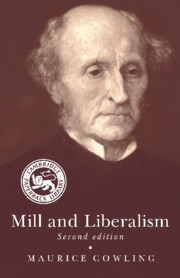Preface to the Second Edition
Published online by Cambridge University Press: 05 November 2009
Summary
Mill and Liberalism, written very rapidly a year earlier, was published in November 1963. At that time many things were in the future the occurrence of which may obscure the fact that, so far from being merely about Mill, it was about a phase in the development of the English public mind – that consensual phase in which the socialism liberal collectivism and international anti-totalitarianism which had been established with the 1940, coalition had provided the over-arching norm of English public thought for nearly twenty-five years.
By November 1963, Gaitskell had died and Macmillan had resigned, but the Wilson primeministership had not begun and had not yet created the moral depression it was to create on the Liberal Left. Ulster had not become a desert, nor Mr Heath leader of the Conservative Party. Powellism was only a gleam in the eye and Thatcherism was not even that. There had been no exodus from the Labour Party, Owenism and Thatcherism had not become havens for exiles, and the Conservative Party had neither tamed the trade unions nor established the ascendancy it was to establish in the 1980s. The ghosts of Tawney, Beveridge and Keynes were still at large, as were Koestler, Snow, Ayer, Hampshire, Jenkins, Crosland, Shonfield, Kahn, Balogh, Kaldor, Joan Robinson, J. K. Galbraith and David Astor. Popper had not been converted, Annan and Beloff had not been ennobled, and Berlin was running ostentatiously against the current he was as conspicuously running with.
- Type
- Chapter
- Information
- Mill and Liberalism , pp. ix - xlviPublisher: Cambridge University PressPrint publication year: 1990

